Over-60s given a booster Covid jab are 20 times less likely to fall severely ill with Covid than those vaccinated with two doses, a major Israeli study has found.
A third dose was also found to slash the risk of becoming infected with the virus tenfold, in the firmest piece of evidence yet that the UK was right to go ahead with a mass booster programme.
The research, led by the country’s health ministry, looked at more than 1.1million Israelis who had been double-jabbed for at least five months.
It found that people given a booster jab were 19.5 times less likely to be hospitalised with Covid than those who were still relying on protection from two doses and 11.3 less likely to test positive for the virus.
Both findings apply to the Pfizer vaccine, which Israel has relied on solely for its coronavirus immunisation programmes.
British experts hailed the findings as ‘spectacularly good’. They come just a day after the UK finally signed off on the campaign for 32million over-50s, health and social care staff and Britons with severe health issues.
Israel became the first country in the world to roll out third doses in August, initially inviting over-60s but later gradually opening it up to everyone over the age of 12.
Nearly 3m Israelis have been ‘boosted’ so far and the country but officials in the UK believe younger people are still enjoying very high protection.
Separate Israeli data also announced today showed a booster dose generates 10 times more antibodies than the second vaccine.
Medics at Sheba Medical Center in Ramat Gan, outside Tel Aviv, compared the antibody levels in staff one week after their third and second doses.
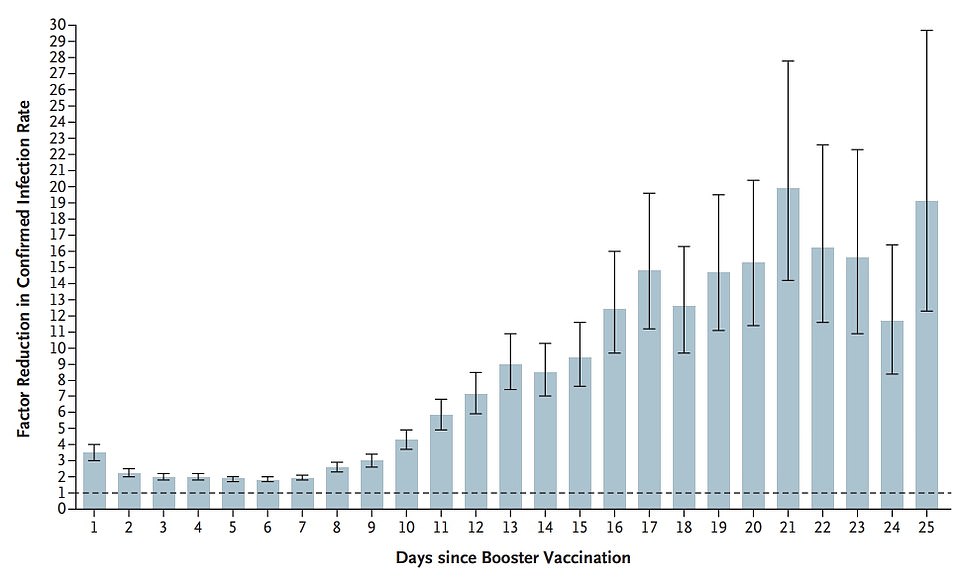
The research, led by the country’s health ministry, looked at more than 1.1million Israelis who had been double-jabbed for at least five months. The Y axis shows a reduction in likelihood to test positive for Covid after a booster, with a greater number representing a lower risk. The X axis is the number of days after the booster vaccine
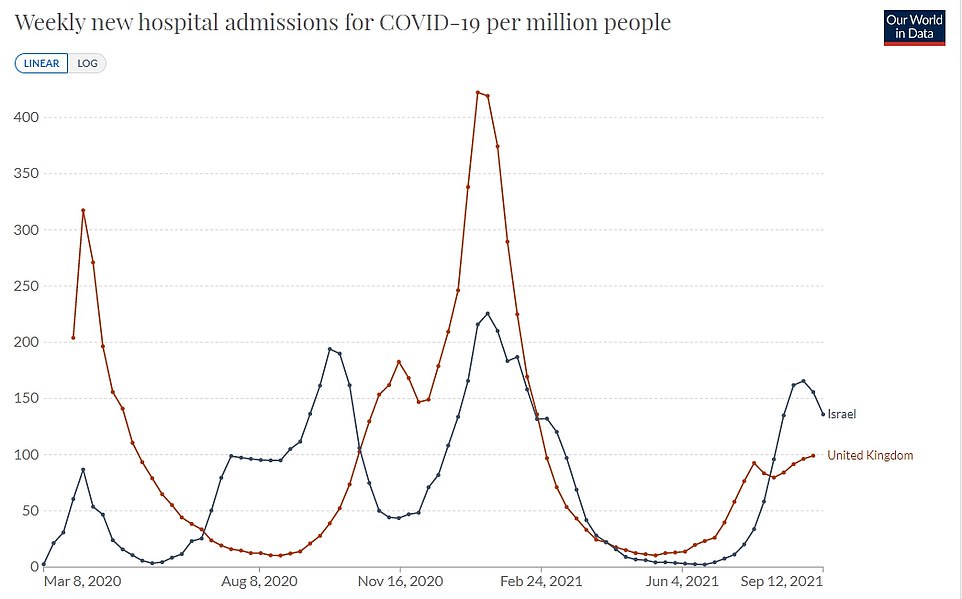
Israel pulled the trigger on a booster vaccine programme in August, which has stabilised the spiralling outbreak. The country recorded 136 hospital admissions in the week to September 12, down from the peak of 165 in the last week of August
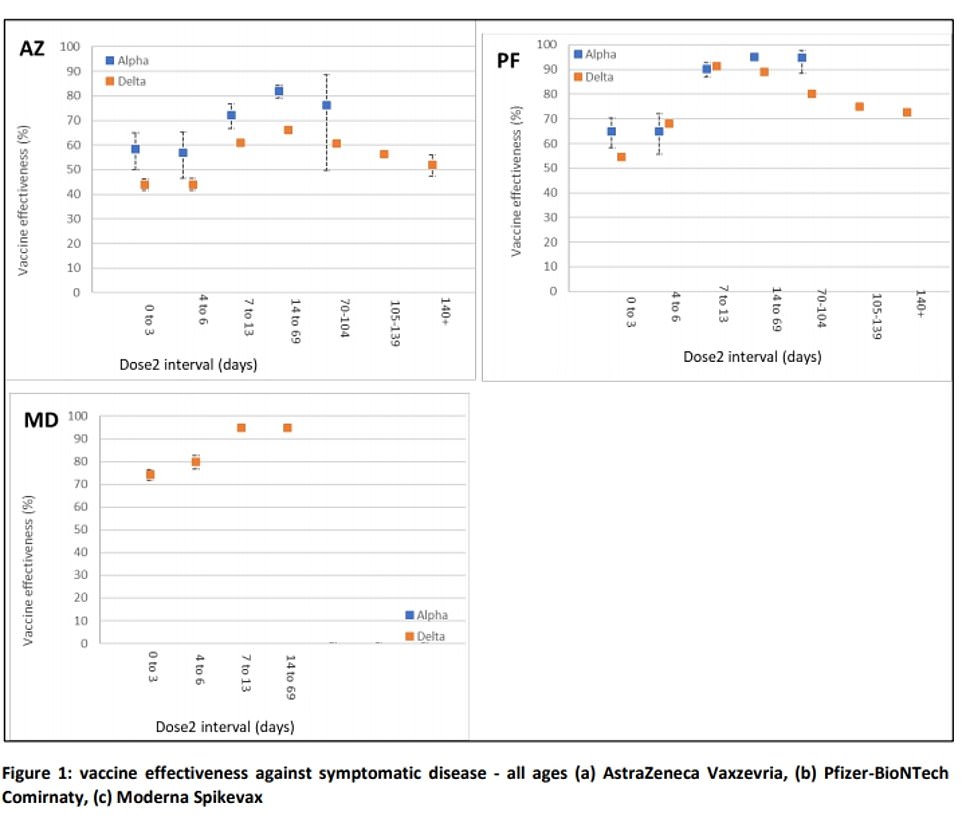
Separate data from Public Health England published on Tuesday to justify the booster plan looked at waning immunity from two doses. It showed that vaccine effectiveness against symptomatic disease wanes by up to 20 per cent, though remains above the 50 per cent threshold for all three vaccines being used in the UK
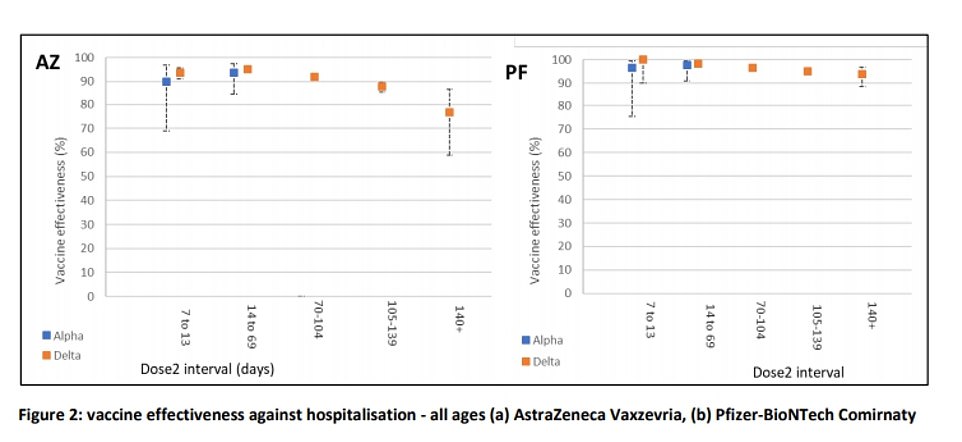
AstraZeneca’s protection against hospitalisation appears to wane quicker than Pfizer’s, dropping to around the 80 per cent mark compared to Pfizer’s 90-plus per cent
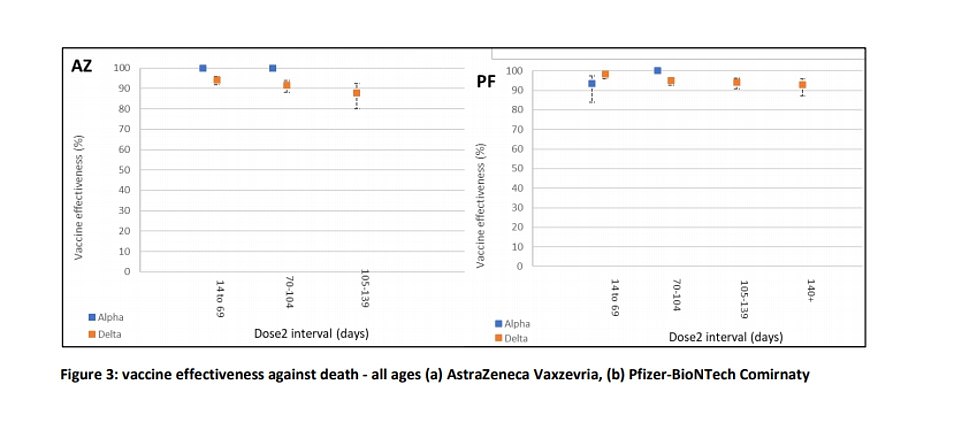
But protection against death remained higher still. Officials say they are uncertain how quickly effectiveness will wane over the coming winter months so boosters have been recommended as a precautionary measure
The latest study, published in the New England Journal of Medicine, looked at 1,137,804 Israelis over the age of 60 who had received two vaccines by March this year.
Boosters were only rolled out to the age group at the end of July, meaning researchers could only track participants for little over a month.
Of those who received boosters, just 934 went on to catch and test positive for Covid in that time compared to 4439 in the non-boosted group.
Third Pfizer Covid vaccine produces 10 TIMES more antibodies than second jab, separate Israeli study finds
A booster Covid vaccine generates 10 times more antibodies than the second dose, an Israeli study has found.
Medics at Sheba Medical Center in Ramat Gan, outside Tel Aviv, compared the antibody levels in staff one week after their third and second doses.
They found that the Pfizer vaccine — which Israel is solely relying on for its immunisation programmes — stimulated a tenfold greater immune response.
While the research only looked at healthcare staff at one specific hospital, it is hoped that the findings will apply more broadly to the rest of the population.
The hospital said it was treating the results with caution and would be monitoring staff in the coming months to see how long the boost to immunity lasts.
Antibodies are just one part of the overall immune response to Covid, which also includes white blood cells known as T cells that give longer protection.
Advertisement
A total of 29 participants that received a third shot were hospitalised with the virus in the following month compared to 294 who were not given boosters.
The researchers said the findings translated to a 19.5 times lower risk of hospitalisation after a booster and a 11.3 times lower risk of infection.
They said their findings ‘give clear indications of the effectiveness of a booster dose even against the currently dominant Delta variant’.
However, they noted that more research was needed to assess how long the boost in immunity lasts.
Dr Peter English, former chair of the British Medical Association’s Public Health Medicine Committee, said the findings were ‘excellent’ and that the UK was bound to see successful results with its booster programme.
‘These are spectacularly good results, which are likely to have a very significant effect on the direct risk to individuals who receive a booster dose, and also to the risk of their becoming infected and transmitting the disease to others; and thus on transmission rates and the effective R number.
‘It is unclear whether such improvements will be seen in the UK.
‘Here, we mostly used a longer prime-boost interval than was used in Israel, which enhanced the initial vaccination effectiveness, so we might not see quite as big an improvement as they found in Israel.
‘But even if the effect of giving a booster dose of vaccine is not as good as this paper found it to be in Israel, they could be extremely beneficial here in the UK.’
Israel had led the way with the original vaccine rollout last December, becoming the fastest country in the world to vaccinate everyone who wanted a jab.
The trail-blazing programme suppressed the virus by summer which allowed it to become one of the first nations to lift all pandemic restrictions.
But cases began to soar over the summer, due to a combination of vaccines waning and the new Delta variant, which infects vaccinated people more easily. Israel pulled the trigger on a booster vaccine programme in August, which has stabilised the spiralling outbreak.
The country recorded 136 hospital admissions in the week to September 12, down from the peak of 165 in the last week of August. Weekly hospitalisations had soared from just four in June.
Cases continue to rise but this is believed to be due to a big testing blitz in schools, which went back at the start of the month. Infections also remain very low among the triple-jabbed, the country’s health ministry said.
The results in Israel will likely have inspired UK health officials to green light a booster programme.
But they have stopped short of recommending third doses to the entire population, with shots being reserved for the roughly 32m deemed most vulnerable to Covid.
It will start next week and Britons will only be invited for a booster six months after getting their second jab. That appears to be the ‘sweet spot’, according to officials who signed off on the move due to waning immunity.

The UK booster programme will be rolled out to the same priority groups as previously (the priority list in the first phase of the vaccine drive which began in December). This means care home residents, health and social care workers, people aged over 50, those aged 16 to 49 years with underlying health conditions that put them at higher risk of severe Covid, adult carers, and adult household contacts of immunosuppressed individuals will be prioritised

Official figures show only 1.6million people in the UK received their second jab six months ago, on March 15. And the first 32million people were not fully immunised until June 24. However, this figure will include hundreds of thousands of under-50s, as uptake is no 100 per cent among those who are eligible for third doses. Boosters have to be given at least six months after the second dose, meaning the majority in the group may not be jabbed until November and December
That decision is largely in line with Israel’s programme, which is only offering third doses to people five months after their second.
However, MailOnline revealed today that only 1.6million people in the UK, mainly care home residents and frontline health workers, were fully vaccinated by March 15 – the cut off point to qualify for a booster.
The UK didn’t breach the 30million mark until June, meaning the campaign won’t be open to millions of vulnerable adults until much closer to Christmas.
Babies could be given Pfizer’s Covid vaccine in the US this winter
Pfizer’s Covid vaccine could be rolled out to babies as young as six months in the US this winter, under plans being drawn up by the pharmaceutical giant.
In a move likely to cause international controversy, the company intends to apply for authorisation to immunise American infants within the next two months.
The timeline will depend on the findings of in-house trials looking into whether the vaccines are safe and effective in youngsters aged six months to five years.
Frank D’Amelio, chief financial officer at Pfizer, told an industry conference yesterday that the firm plans to ‘go file’ by November, the Financial Times reports.
‘We would expect to have… data for children between the ages of six months and five years old that we would file with the FDA,’ D’Amelio said at the Morgan Stanley Global Healthcare Conference. ‘I’ll call it in the weeks shortly thereafter the filing of the data for the five- to 11-year-olds.’
Pfizer was already planning to seek approval from the Food and Drug Administration (FDA) for the jabs to be given in children aged five to 11 by October.
But the latest comments confirm the firm’s intention to work its way down much younger age groups. They will be given a lower dose than adults.
Pfizer’s jab, made alongside German partner BioNTech, is already approved for over-12s in Britain.
Advertisement
Experts told MailOnline the decision to delay boosters by six months should not be a cause for concern because the gap means people are only given a top-up dose as their immunity starts to wane.
But they warned it could be a problem for a ‘small number’ of older and vulnerable people whose immunity drops faster than expected.
Booster doses of the Pfizer jab, or a half dose of Moderna, will be administered to those eligible from next week, regardless of which jab they initially received.
For those who cannot get either of those two mRNA jabs, such as due to an allergy, they will be given a dose of AstraZeneca’s vaccine.
The jabs will be dished out through vaccination centres, primary care networks and pharmacies and can be given at the same time as annual flu jabs.
Department of Health bosses said the booster campaign will ‘ensure the protection vaccines provide for those most at risk of severe illness from Covid will be maintained over the winter months’.
It is the first phase of the Government’s winter plan to avoid another lockdown. If hospitalisations rise quickly, ministers have warned they could be forced to reintroduce face masks and work from home guidance.
The Prime Minister was told it is better to act early, rather than dithering and having to go harder to fight off any surge later this year.
Government statistics show the UK hit 10million second vaccinations on April 18, meaning the third dose rollout will not be open to a third of those eligible until mid-October.
And it took until June 24 to administer 32million second doses, meaning those with waning immunity could be heading into the Christmas season with low levels of protection.
But that figure includes hundred of thousands of under-50s, given that uptake for the jab has never been 100 per cent in any of the most vulnerable groups.
NHS figures suggest there are still around half a million over-50s who have yet to have their first jab, and up to 1.1million who haven’t had their second.
Dr Simon Clarke, a cellular microbiologist at the University of Reading, told MailOnline he does not see the small numbers immediately eligible for boosters as a problem.
He said: ‘Put simply, we don’t know how this will play out over the winter and it’s worth pointing out that the annual flu numbers are worse in January and February, so it could be the same with Covid.
‘It’s important not to give boosters too early as their effectiveness may well wane over time too.
‘Data seems to indicate that immunity drops off quickest in the most elderly, who were vaccinated first. Given as these should be boosted first, this problem should be mitigated.
‘There may however be a small number of people in their 50s and 60s whose immunity drops more quickly than the average, so what you suggest could be a problem for these people.
‘However, there’s no realistic way of knowing who these people are in such a large population.’
Professor Saul Faust, an infectious disease expert at the University of Southampton, told MailOnline people having to wait until winter to get a booster is ‘not concerning’ because immunity lasts six months after two doses.
He said the rollout will be staggered as people become eligible at six months and means the NHS is able to cope with demand.
‘Some people will need to go for flu vaccines separately from Covid vaccines though, which the NHS will be taking account of,’ Professor Faust added.
Dr Doug Brown, chief executive at the British Society of Immunology, told MailOnline: ‘Receiving two vaccinations against Covid has been show to be highly effective at preventing severe disease, hospitalisation and death as well as generating an effective immune response that does provide this protection in the long term.
‘We don’t yet know exactly how long immunity will last, which is why the government’s decision to offer booster doses to the most vulnerable is a welcome move which will help us be prepared for the worst this winter.
‘With the third dose being offered six months after the second, studies have shown that we can be confident that for those six months people will have protection during that period from their initial vaccinations with the third dose providing an additional boost to the immune system.
‘In addition to boosters, we must not take our foot off the gas and continue to make every effort to reach people who have not had their first doses of the vaccine and encourage them to come forward for a Covid vaccination.
‘Vaccination is our only way out of this pandemic.’
Earlier this month, half a million severely immunosuppressed people, who are most at-risk from Covid and were unable to mount a full response to the vaccine, were invited to get a third dose.
Source link : https://www.dailymail.co.uk/news/article-9994369/Proof-Covid-booster-vaccines-work-Israeli-data-shows-rates-severe-illness-20-TIMES-lower.html











